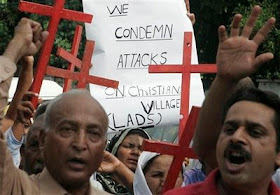 The well-publicized situation of a Christian lady Aasia Noreen who was attempted and convicted for blasphemy beneath Islamic law was one of the main national stories in Pakistan throughout 2010. Based on monthly Newsline’s polls, Noreen’s case was 4th major story of the year while Aafia Siddiqui’s, a Pakistani lady convicted within the U.S. on terrorism charges, story was standing in 6th place. Pakistani fundamentalist groupings and political parties, especially MQM, have been demanding Siddiqui’s release from an American jail.
The well-publicized situation of a Christian lady Aasia Noreen who was attempted and convicted for blasphemy beneath Islamic law was one of the main national stories in Pakistan throughout 2010. Based on monthly Newsline’s polls, Noreen’s case was 4th major story of the year while Aafia Siddiqui’s, a Pakistani lady convicted within the U.S. on terrorism charges, story was standing in 6th place. Pakistani fundamentalist groupings and political parties, especially MQM, have been demanding Siddiqui’s release from an American jail.On Nov. 8, 2010, Noreen, 45-years old along with a resident of the Muslim village of Ittawali within the Punjab province of Pakistan was sentenced to death by a Pakistani court for allegedly defaming Muhammad, the founder of Islam. Her case once again brought back to light the black laws of blasphemy.
Pakistan has among strictest Islamic blasphemy laws within the world. The primary purpose of those laws would be to guard Islamic authority. The laws are part of a system that provides preference to Muslims over non-Muslims. Based on human rights groups, these laws have been extensively misused against Christians, Hindus, Ahmadis, Shiites and liberal Muslims since the 1980s. Christians have been demanding for the repeal of blasphemy laws, while Islamists have been organizing protest rallies in favor of the laws.
Not even one political party is ready to oppose the laws. Afrasiab Khattak, a leader of ANP, a secular party, has said they can assistance amendments to the law, rather than repeal. Interestingly, Khattak was as soon as chairman of Human Rights Commission of Pakistan (HRCP) and advocated the total repeal of the laws.
Pasban, an Islamic group, demanded the release of Dr Aafia Siddiqui throughout celebrations on December 26 of the birthdate of the president of Pakistan Muhammad Ali Jinnah. This was followed by a complete shutdown of merchants’ shops across the nation on New Year’s Eve as faith based parties held rallies to protests against any supposed move by the government to amend the blasphemy laws. The Tehreek Tahaffuz-e-Namoos-e-Risalat (TTNR) had known as on Muslims to observe the so-called shutter-down.
In political terms there is little representation of religious parties in parliament and the public has never been voted for these parties since its independence. Despite the government’s firm assurances that the law would remain unchanged, leaders of the religious parties just wanted to show their strength as soon as once more. The TTNR asked the government to dismiss Punjab Governor Salman Taseer and ask Sherry Rehman, each of whom belong to the ruling party (PPP), to resign from the National Assembly because they have taken positions against the blasphemy laws. On the same day, the opposition parties in the Punjab Assembly staged a token walkout throughout the session to express solidarity using the religious parties. “I call it a natural result of religious extremism that's on the rise in Pakistani society,” said Mehdi Hasan, the chairman of the independent HRCP. Some call these events as “Zia’s children” simply because it was General Zia-ul-Haq was introduced these draconian laws in 1980s.
Because 1986, much more than 40 persons accused of blasphemy have been murdered. Of these, 16 were Christians, 14 Muslims, five Ahmadis and two Hindus. These killings have never been pursued by the victims’ families out of fear of further persecution. On Nov. 11, 2010, Imran Latif, a Muslim, 22, of Pir Makki in Lahore, was murdered by two armed men. He was on bail against charges of burning the pages of Holy Quran. It was an additional case of extra judicial murder in blasphemy instances.
Tidak ada komentar:
Posting Komentar